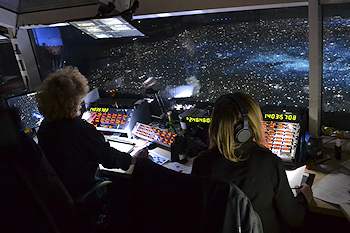Special Report:Flexible Fibre Networks

During the Sochi Games fibre-based media transport systems were needed for coverage of competitions and ceremonies coverage, and also for sports presentations, timekeeping and more.
All of these applications required the distribution of synchronized audio, video and data signals in real time. What’s more, many of these applications demanded more than just point-to-point links and were variable, often changing with little notice.
All of these factors were covered by a Riedel MediorNet real-time network. The Riedel system combines FDM (Frequency Division Multiplex) with CWDM (Coarse Wavelength Division Multiplexing) modules and TDM (Time Division Multiplex) in one engine. This means that MediorNet can maximize the available bandwidth on each fibre. CWDM-only solutions are less bandwidth-efficient and thus require more fibre.
The use of MediorNet across all venues in Sochi reduced the fibre requirements to the degree that only a single fibre pair was necessary. The use of a second fibre pair added the full redundancy essential for such an important event.
On top of the benefits offered by MediorNet’s fibre networking features are the advantages gained from the solution’s processing power and routing capabilities. Because the solution’s routing can be changed within less than one video frame, the system can even replace the video router — offering all the flexibility needed for last-minutes changes or dynamic routing during competitions.
The integrated frame syncs, embedders, and de-embedders, and other glue features, make the solution ideal for fast-paced high-profile live sport events. MediorNet was used at all Sochi venues, with hundreds of devices deployed to transport thousands of signals.
The resulting fibre network supported signal transport for events at the Olympic Park and nearby venues, as well as the snow and ice events held in the mountain venues.
The bulk of the fibre backbone itself was a temporary overlay by Riedel, which combined with existing fibre cables installed within each venue and special runs — such as the connectivity to the top of the ski jump — to create a complete network. In total, Riedel installed approximately 50 km of the company’s Pure range of optical cables.
Delays in construction did present significant challenges. In fact, Riedel gained access to the last preinstalled fibre cable just one day before competition began, and the company was unable to finish several cable routes prior to the first event. Nevertheless, leveraging the versatility of the system, the company completed an operational installation on time. Because MediorNet can run in ring, star, daisy chain or any combination of those configurations, the system could be configured to use the remaining available routes.
Once the backbone was completed, the system functioned as originally designed and specified, thus assuring the redundancy required. For the ceremonies at Sochi’s Fisht Stadium, Riedel installed fibre in a redundant ring structure, with four strands on the main line and four strands on the backup line, all installed along different routes. Here, the MediorNet system supported production video monitoring, which was used not only to coordinate the extensive cast involved in the production, but also — and more importantly — to give team members virtual access and an eye on all areas of the site.
Flexible fibre-based signal transport solutions have become the clear solution when reliable AV transport and communications are a must. In Sochi, fibre transport and networking gave production crews the edge they needed in a live production environment.
Get the TV Tech Newsletter
The professional video industry's #1 source for news, trends and product and tech information. Sign up below.

